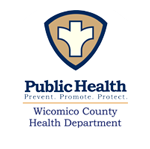Beaches, Pools & Water Safety
 Public Bathing Beach Status
Public Bathing Beach Status
Cove Road Beach: OPEN
Roaring Point Beach: OPEN
Tyaskin Wharf Beach: OPEN
Last updated 08/22/2023
Check the Status of Your Favorite Beaches!
Did you know that Maryland’s Department of the Environment maps out where it’s safe to harvest oysters?
Click here to see what areas are open/closed for oyster harvesting
RECREATIONAL WATER ILLNESSES
What are RWIs?
Recreational water illnesses (RWIs) are caused by germs spread by swallowing, breathing in mists or aerosols of, or having contact with contaminated water in swimming pools, hot tubs, water parks, water play areas, interactive fountains, lakes, rivers, or oceans. RWIs can also be caused by chemicals in the water or chemicals that evaporate from the water and cause indoor air quality problems. Diarrhea is the most common RWI, and it is often caused by germs like Crypto (short for Cryptosporidium), Giardia, norovirus, Shigella, and E. coli O157:H7. Other common RWIs include skin, ear, respiratory, eye, neurologic, and wound infections. Children, pregnant women, and people with weakened immune systems are most at risk for RWIs.
Where Are RWIs Found?
 Swimming Pools, Water Parks, Water Play Areas
Swimming Pools, Water Parks, Water Play Areas
The most common RWI is diarrhea. Swallowing water that has been contaminated with feces containing germs can cause diarrheal illness.
Swimmers share the water—and the germs in it—with every person who enters the pool. On average, people have about 0.14 grams of feces on their bottoms which, when rinsed off, can contaminate recreational water. In addition, when someone is ill with diarrhea, their stool can contain millions of germs. This means that just one person with diarrhea can easily contaminate the water in a large pool or water park. People may not realize that although there is no standing water in interactive fountains/water play areas, the spray water will rinse any contaminants (for example, diarrhea, vomit, and dirt) down into the water holding area and be sprayed again. In other words, the water is recycled through the system.
Swallowing even a small amount of recreational water that has been contaminated with feces containing germs can make you sick.
To ensure that most germs are killed, check chlorine or other disinfectant levels and pH regularly as part of good pool operation.
Resources:
Code of Maryland (COMAR) Regulations 10.17.01 – Swimming Pools
Critical & Major Violations COMAR 10.17.01

Hot Tubs
Skin infections like “hot tub rash” are a common RWI spread through hot tubs and spas. Respiratory illnesses are also associated with the use of improperly maintained hot tubs.
The high water temperatures in most hot tubs make it hard to maintain the disinfectant levels needed to kill germs. That’s why it’s important to check disinfectant levels in hot tubs even more regularly than in swimming pools.
 Decorative Water Fountains
Decorative Water Fountains
Not all decorative fountains are chlorinated or filtered. Therefore, when people, especially diaper-aged children, play in the water, they can contaminate the water with fecal matter. Swallowing this contaminated water can then cause diarrheal illness.
 Oceans, Lakes, and Rivers
Oceans, Lakes, and Rivers
Oceans, lakes, and rivers can be contaminated with germs from sewage spills, animal waste, water runoff following rainfall, fecal incidents, and germs rinsed off the bottoms of swimmers. It is important to avoid swallowing the water because natural recreational water is not disinfected. Avoid swimming after heavy rainfalls or in areas identified as unsafe by the Health Department. For more information, or to check the status of our beaches, please visit our beach page.
How Can We Prevent Recreational Water Illnesses (RWIs)?
Steps for Healthy Swimming
Here are a few easy and effective healthy swimming steps all swimmers can take each time we swim to help protect ourselves, our families, and our friends from recreational water illnesses (RWIs):
Keep the pee, poop, sweat, and dirt out of the water!
- Stay out of the water if you have diarrhea.
- Shower before you get in the water.
- Don’t pee or poop in the water.
- Don’t swallow the water.
Every hour—everyone out!
- Take kids on bathroom breaks.
- Check diapers, and change them in a bathroom or diaper-changing area–not poolside–to keep germs away from the pool.
- Reapply sunscreen.
- Drink plenty of fluids.
Check the free chlorine level and pH before getting into the water.
- Pools: Proper free chlorine level (1–3 mg/L or parts per million [ppm]) and pH (7.2–7.8) maximize germ-killing power.
- Hot tubs/spas: Proper disinfectant level (chlorine [2–4 parts per million or ppm] or bromine [4–6 ppm] and pH [7.2–7.8]) maximize germ-killing power.
- Most superstores, hardware stores, and pool-supply stores sell pool test strips.
Resources:
Code of Maryland (COMAR) Regulations 10.17.01 – Swimming Pools
Critical & Major Violations COMAR 10.17.01



